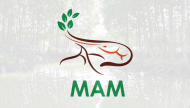Coastal Transformation in the Mekong Delta

Mangroves and markets project as an initiator of transformational change for the coastal Mekong Delta Region. IKI project presents successful results at final workshop.
The mangroves in the Mekong Delta are an important building block in the fight against the effects of climate change. For example, they protect the population from extreme weather events and are an important source of income. Therefore it is important to conserve and restore the mangrove ecosystems.
Goals, that the project “Scaling up Ecosystem-based Adaptation (EbA) in the Mekong Delta”, commonly known as Mangroves and Markets project (MAM), successfully achieved in its almost four-year duration. Therefore it addressed the deforestation of mangroves driven by shrimp farming. This was accomplished by engaging shrimp processing and export companies through their supply-chains and working with smallholder farmers in mangrove areas in shifting towards organic and sustainable integrated mangrove-shrimp production systems.
Projects outstanding achievements
The project was implemented by SNV Netherlands Development Organisation and the International Union for the Conservation of Nature (IUCN) in partnership with the provincial governments of Ca Mau, Ben Tre and Tra Vinh. The achievements were presented at the final workshop held on 9 January 2020 in Ho Chi Minh City, Vietnam.
Some key numerical achievements included; the conservation of 15,600 hectors of mangroves under sustainable management with over 50% mangrove cover, the restoration of 80 hectors of mangroves, training more than 5,500 farmers in sustainable production methods and the certification of 3,200 farmers and 2 hatcheries. Added to this, at the community level the project managed to change the understanding of local community and authorities. They also created linkages between farmers in farming and selling their shrimps through farmer groups to improve market access, and improved productivity and efficiency of shrimp farming and the Sustainable development of aquaculture.
Joerg Rueger, the first Secretary of the German Embassy on Environment and a representative of Federal Minister for the Environment, Nature Conservation, and Nuclear Safety (BMU) commended the project saying, “This is one of the most successful initiatives funded by the BMU in Vietnam. It impressively protected mangroves, generated a stable income for 3,200 farmers, while at the same time producing a sustainable supply of high quality and ecologically-certified shrimps for consumers around the world”.
What was the approach employed?
The project’s multi-stakeholder approach as presented by Nguyen Thi Bich Thuy (SNV’s project manager) was recognised as essential in delivering results. This approach included addressing public sector needs to conserve and restore mangroves, the effective engagement of the private sector and addressing the livelihood security to improving incomes of shrimp farming communities vulnerable to climate change.
 SNV aimed to foster ‘systems change’. This is seen in the MAM project that met four key criteria for bringing about systemic change. First, it kick-started a viable and sustainable market for organic certified shrimps, working with business champions and major players in the shrimp industry. Second is the adoption of the project approaches by the government and others organisations e.g. the UN-REDD/FAO promoted MAM activities, the World Bank Integrated Coastal Resilience and Sustainable Livelihoods project also plans to upscale the projects interventions. Third, the project has leveraged additional finance by developing aquaculture PFES which has already provided excess pre-payments from shrimp processing companies to shrimp farmers for maintaining and restoring mangroves on their shrimp farms; and last but not least the project changed social behaviours and norms as farmers now adopt organic and sustainable practices.
SNV aimed to foster ‘systems change’. This is seen in the MAM project that met four key criteria for bringing about systemic change. First, it kick-started a viable and sustainable market for organic certified shrimps, working with business champions and major players in the shrimp industry. Second is the adoption of the project approaches by the government and others organisations e.g. the UN-REDD/FAO promoted MAM activities, the World Bank Integrated Coastal Resilience and Sustainable Livelihoods project also plans to upscale the projects interventions. Third, the project has leveraged additional finance by developing aquaculture PFES which has already provided excess pre-payments from shrimp processing companies to shrimp farmers for maintaining and restoring mangroves on their shrimp farms; and last but not least the project changed social behaviours and norms as farmers now adopt organic and sustainable practices.
The link has been copied to the clipboard
Contact
IKI Office
Zukunft – Umwelt – Gesellschaft (ZUG) gGmbH
Stresemannstraße 69-71
10963 Berlin
Related Videos
Related Publications
-
 05/ 2022 | IKI Evaluation
05/ 2022 | IKI EvaluationScaling up mangrove EbA in the Mekong Delta
German with executive summary in English (PDF, 1 MB)








